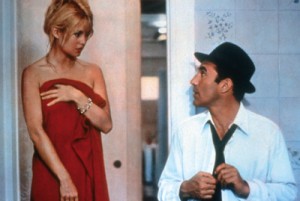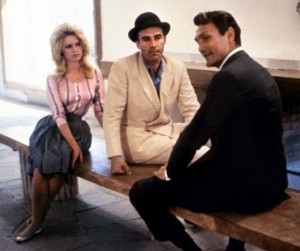World War II ended in 1945, but the battle waged on for Jean-Luc Godard, who saw the Allied victory affording America with the opportunity for post-war cultural imperialism. That dynamic courses beneath the surface of Godard’s Contempt, a bitter but ingenious CinemaScope drama that ranks as one of the very best films from Godard’s amazing string of masterpieces during the 1960s.
An adaptation of Ghosts at Noon, Alberto Moravia’s novel of matrimonial discord, Contempt takes place on the set of a tortured film production in Italy. Fritz Lang, playing a version of himself, has been hired to make a big-screen adaptation of the Odyssey by Jeremy Prokosch (Jack Palance), a crass, uncultured vulgarian with a god complex. Disatisfied with the art film that Lang has turned in, Prokosch summons playwright Paul Javal (Michel Piccoli) for rewrites to Cinecittà Studios, the once-vibrant center of Italian cinema that is now little more than a soundstage ghost town. Paul brings with him his gorgeous wife Camille (Brigitte Bardot), and it’s immediately clear that the producer has designs on his new employee’s wife.
 Despite Prokosch’s wolfish reputation, Paul leaves his wife alone with his boss for an extended spell. And in that period, the marriage is permanently wounded. It’s never clear what’s happened between the producer and Camille during their time together, but she turns cold to Paul afterwards. When her husband repeats the same irresponsible (opportunistic?) act again, there’s no chance for reconciliation. Not knowing Paul’s intentions or what has actually occurred between Prokosch and Camille turns the film into a painful frustration dream. It does more than hurt–it also haunts.
Despite Prokosch’s wolfish reputation, Paul leaves his wife alone with his boss for an extended spell. And in that period, the marriage is permanently wounded. It’s never clear what’s happened between the producer and Camille during their time together, but she turns cold to Paul afterwards. When her husband repeats the same irresponsible (opportunistic?) act again, there’s no chance for reconciliation. Not knowing Paul’s intentions or what has actually occurred between Prokosch and Camille turns the film into a painful frustration dream. It does more than hurt–it also haunts.
But no matter how painful the marriage coming undone is, it isn’t the greatest loss to the director. He is more concerned with cultural loss, what he sees as the domination of the world film industry by the U.S., which was mirrored by Godard’s own battles with American producer Joseph Levine, who wanted his director to get Bardot to bare as much of her heavenly body as possible to ensure big box office.
When Prokosch is warned in one scene that it will be difficult to bend Lang’s will to his own, since, after all, the director defied Goebbels in 1943, he spits back: “This isn’t 1943. It’s 1963. And he’ll direct what he’s told.” And instantly one troubled film production is transformed into a metaphor for an international power struggle.•
Recent Film Posts:
- Classic Film: Punishment Park (1971)
- Strange, Small & Forgotten Films: The Intruder (1962)
- Strange, Small & Forgotten Films: They Came Back (2004)
- Classic Film: The Rapture (1991)
- Recent Film: Somewhere
- Recent Film: Another Year
- Classic Film: The Truman Show (1996)
- Classic Film: Salesman (1968)
- Classic Film: Night of the Living Dead (1968)
- Classic Film: The Conversation (1974)
- Classic Film: King of Comedy (1982)
- Recent Film: Dogtooth
- Classic Film: RoboCop (1987)
- Recent Film: Marwencol (2010)
- Classic Film: Being There (1979)
- Classic Film: Woman in the Dunes (1964)
- Classic Film: The Man in the White Suit (1951)
Tags: Brigitte Bardot, Fritz Lang, Jack Palance, Jean Luc-Godard
Subscribe to my free Substack newsletter, "Books I Read This Month." It's published on the final day of each month. Some new titles, some older, some rare.
Categories
About
Afflictor.com is the website of Darren D’Addario. Except where otherwise noted, all writing is his copyrighted material. ©2009-18.

